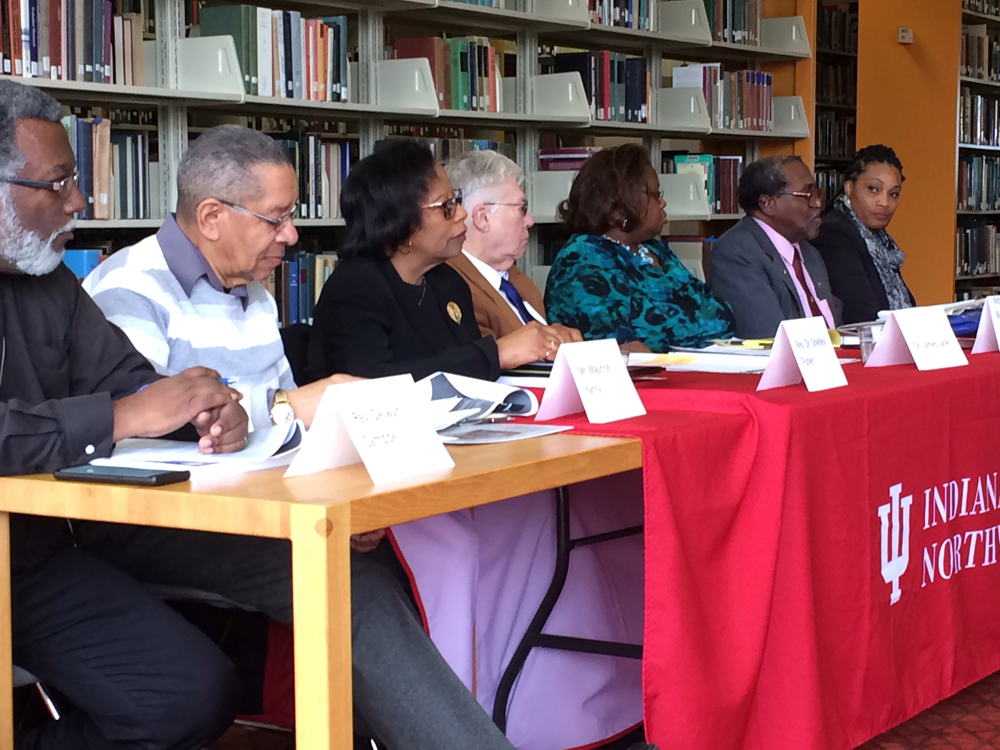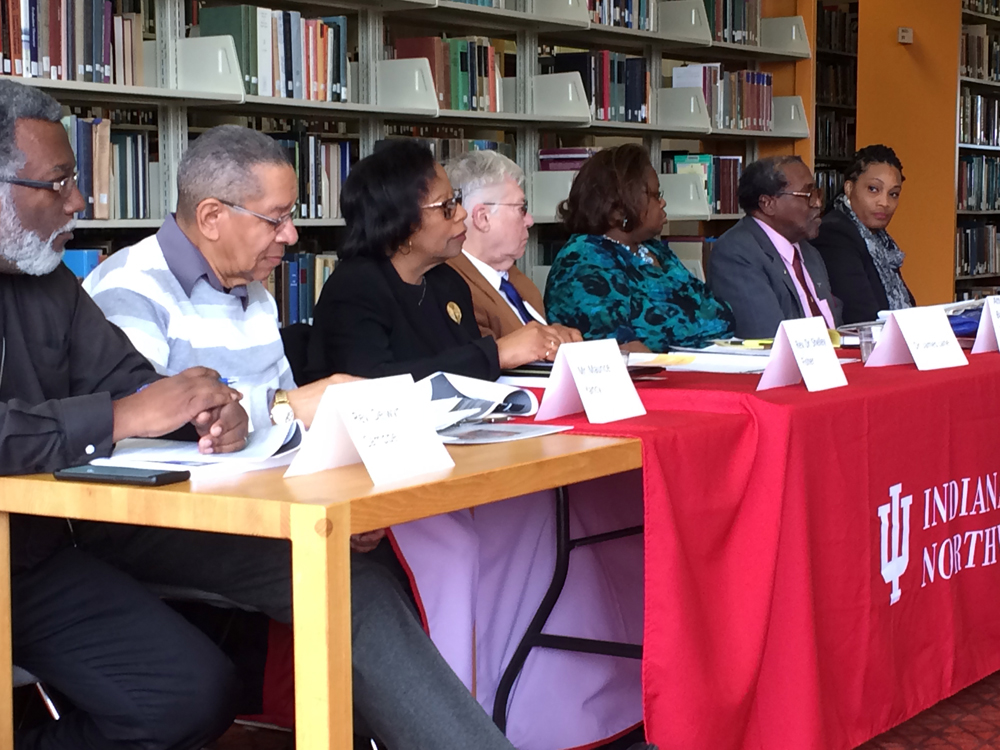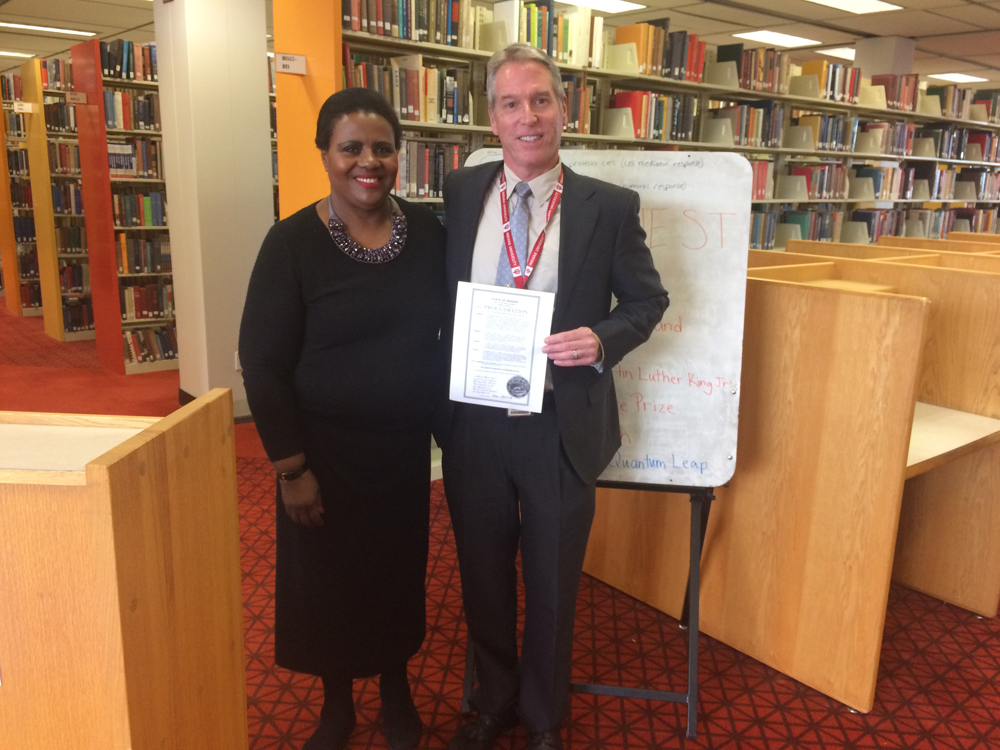
IUN panel discusses Dr. Martin Luther King, Jr.
IU Northwest commemorates Dr. Martin Luther King, Jr.
Contributed By:The 411 News
In some ways, 2018 mirrors Dr. King's world in 1960s
Pastors, attorneys, a human relations commissioner, a historian, and university volunteer sat down at Indiana University Northwest on Wednesday, April 4 for a panel discussion to reflect on Dr. Martin Luther King, Jr., fifty years after his death.
Sessions similar to the one at IUN were held that day and during the week across the nation to remember Dr. King’s life and ideas.
The historian, IUN’s Professor Emeritus Dr. James B. Lane recalled the days of April 1968 when angry blacks rioted in many U.S. cities after Dr. King’s assassination. “But Gary didn’t go up in flames, because newly elected Mayor Richard Hatcher and Gary Roosevelt’s state championship basketball team, together, went into the neighborhoods spreading Dr. King’s message of non-violence. They asked the young people to be cool and don’t destroy your city.”
Panelists included Rev. Delwyn Campbell, Pastor, St. John's Evangelical Church, Gary; Rev. Dr. Shelley Fisher, Associate Minister, First Baptist Church, Gary; Attorney John Henry Hall, Katie Hall Education Foundation, Gary; Attorney Barbara Bolling-Williams, President, Indiana State Conference NAACP; Atty. Haneefah Khaaliq, Director, City of Gary Human Relations Commission; and Maurice Yancy, IUN volunteer and local historian.
The event is part of a series of discussions occurring in 2018 sponsored by Indiana Humanities’ Quantum Leap initiative, which explores the connections between the humanities and the STEM (science, technology, engineering, mathematics) fields.
When he accepted his Nobel Peace Prize in 1964, Dr. Martin Luther King, Jr. compared the world’s technological progress—the dawn of computers, the launch of the first man into orbit around the Earth, telecommunications that could shrink the globe—with the slow and difficult pace of social change.
The moderator, Junifer Hall, CEO and Chairman, Katie Hall Educational Foundation, asked the panel to comment on Dr. King’s 1964 complaint about the leaps in technology but the lags in social change. Dr. King noted there was “a poverty of spirit in the world today.”
The consensus of the panel: 2018 mirrors Dr. King’s world in 1964.
Rev. Shelly Fisher said, “Then as now, our many technological advances signal great progress, but our social concerns for family and man lags.”
“Same problems as Dr. King saw in 1964,” said Rev. Campbell. “Technology has made our world smaller and more inter-connected, but we’ve become more hostile. It’s a poverty of spirit.”
Atty. Bolling-Williams agreed that technology has made our globe smaller, “But as a tool, it has divided us. We haven’t found the right ways to use it. We have ceased to strive for caring for our fellow man.”
Atty. Hall said, “Instead of a race for peace, our national and international leaders are talking about developing more powerful weapons to annihilate each other.”
The panel also discussed Dr. King’s ideas of non-violence, how he connected the war in Viet Nam with racial injustice at home, and ways to close the moral and spiritual lag.
On ways to close the moral and spiritual divide, Commissioner Khaaliq added, “You’ve heard the revolution will not be televised. Well, the revolution starts with the friends and family you come in contact with everyday. It’s about loving them enough and having the courage to correct some of the things they say and do.”

Panel (l-r) Rev. Delwyn Campbell, Maurice Yancy, Rev. Shelly Fisher, Prof. James Lane, Atty. Barbara Bolling, Atty. John Hall, and Atty. Haneefah Khaaliq

Junifer Hall and IUN’s Scott Sandberg, who arranged the panel discussion with help from the Indiana Humanities’ Quantum Leap initiative. Sandberg is the Digital Scholarship & Geographic Adaptive Technologies Librarian at the university’s John W. Anderson Library.
Story Posted:04/06/2018
|